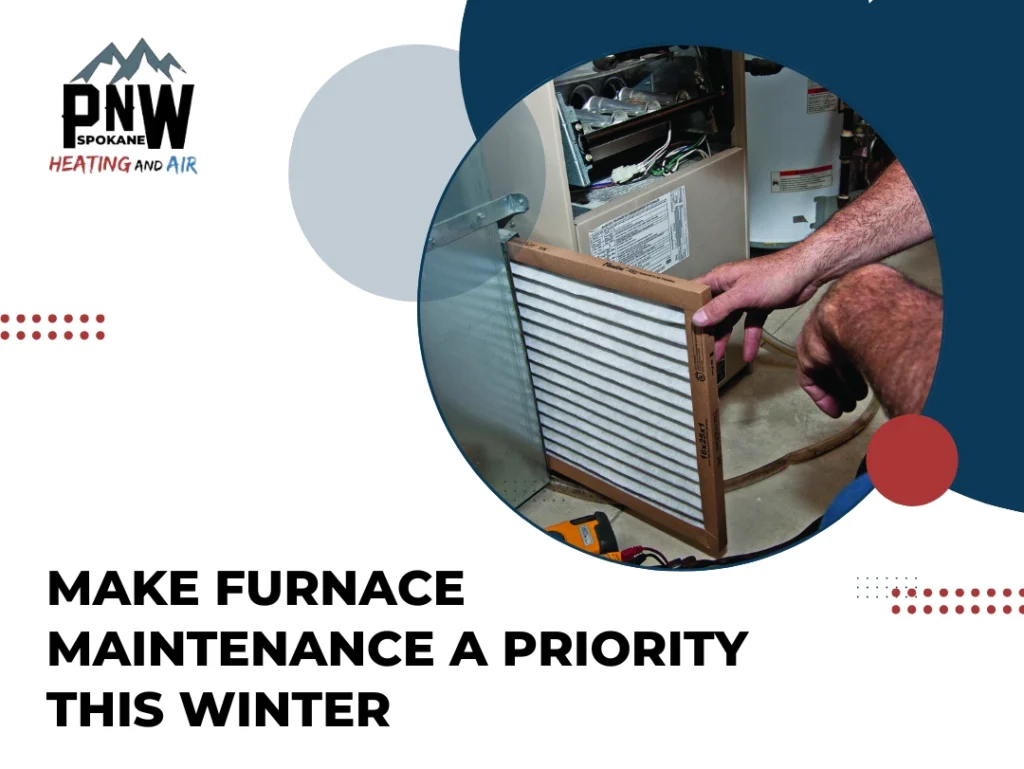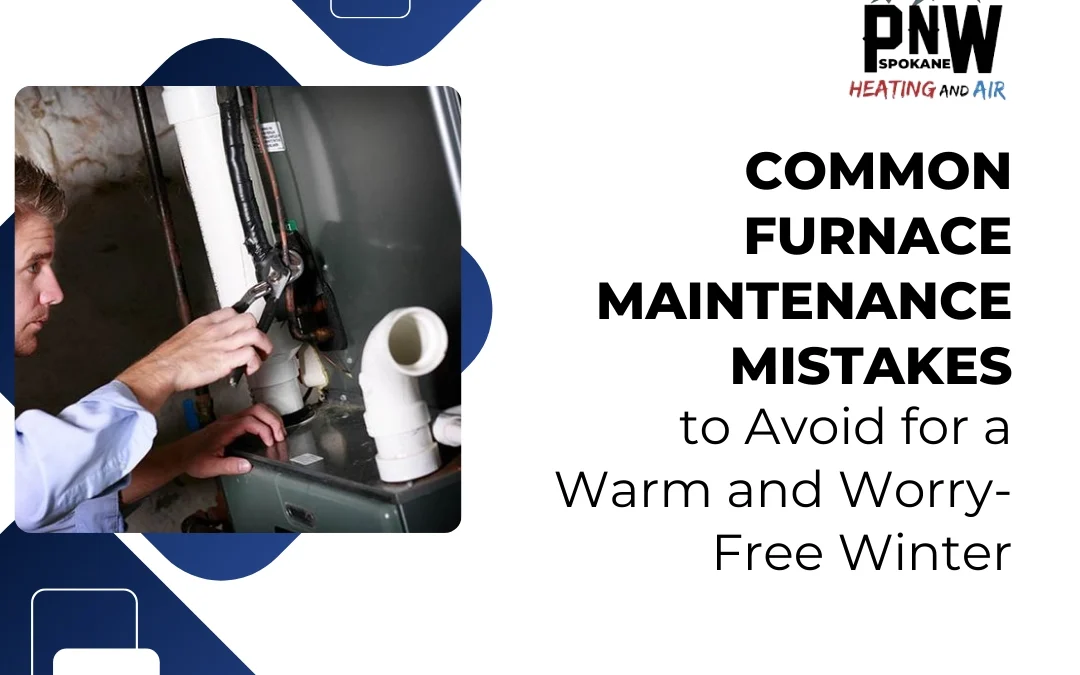In this guide, we’ll explore some of the most common mistakes in furnace maintenance. Knowing what to avoid and how to take simple preventive measures can help you keep your furnace running smoothly, reduce your energy bills, and enjoy a cozy home all season long.
1. Neglecting Regular Furnace Maintenance
Why It’s a Mistake
It’s easy to overlook regular furnace maintenance, especially if your system seems to be running fine. However, a lack of regular maintenance can cause minor issues to go undetected, eventually leading to bigger, more expensive problems. Without regular upkeep, components wear out faster, which can force your furnace to work harder, reducing its efficiency.
Recommended Maintenance Frequency
A furnace should receive a professional tune-up at least once a year, preferably before the heating season begins. Regular tune-ups help keep your furnace running efficiently, extend its lifespan, and reduce the likelihood of needing emergency furnace repair services in Spokane.
Consequences of Neglect
Skipping maintenance increases energy consumption, leading to higher heating bills. Additionally, neglected furnaces have a higher chance of breakdowns during the peak winter months when you need them the most.
2. Ignoring or Forgetting Filter Changes
Why It’s Critical
Your furnace’s air filter plays a crucial role in keeping the system clean and efficient. Dirty or clogged filters block airflow, making your furnace work harder and use more energy. Over time, this can lead to overheating and potential damage to internal parts.
Proper Filter Change Frequency
Ideally, the filter should be replaced every 1-3 months, depending on usage and filter type. For homes with pets or residents with allergies, monthly filter changes are often recommended. It’s also important to choose the right type of filter for your furnace, as some filters can overly restrict airflow, reducing efficiency.
How a Clean Filter Helps
A clean filter boosts efficiency and improves indoor air quality. It helps to trap dust, allergens, and other airborne particles, creating a healthier environment in your home.
3. Skipping Thermostat Maintenance and Calibration
Common Mistake
The thermostat is the brain of your heating system, controlling temperature and ensuring that the furnace cycles properly. Failing to check and calibrate the thermostat can lead to inaccurate readings, causing your furnace to turn on and off more frequently than needed.
Impact on Efficiency
An incorrectly calibrated thermostat can lead to higher energy bills, as the furnace may cycle unnecessarily or fail to keep your home at the desired temperature. Dust and dirt can also interfere with the thermostat’s performance, causing it to send inaccurate signals to the furnace.
Tips for Thermostat Care
Regularly dust the thermostat to keep it clean, and test it for accuracy by comparing it with a reliable thermometer. If your thermostat is old, think about upgrading to a programmable or smart model. These devices allow you to schedule heating times more effectively, helping you save energy without sacrificing comfort.
4. Not Checking or Cleaning Vents and Registers
Why This Matters
Blocked or dirty vents and registers can restrict airflow throughout your home, causing uneven heating and making your furnace work harder to distribute heat. This added strain can reduce the system’s efficiency and potentially lead to premature wear on its components.
Common Mistakes
Homeowners often forget to clean vents or may unknowingly block them with furniture or curtains. This limits airflow, making it difficult for the furnace to circulate warm air effectively.
Proper Cleaning and Maintenance
Ensure that all vents and registers are free from dust and debris by vacuuming them regularly. Keep them clear of obstructions, and avoid covering them with furniture or rugs. This allows warm air to flow freely, making it easier for the furnace to maintain a consistent temperature throughout your home.
5. Ignoring Unusual Noises or Smells
Warning Signs
Strange sounds like banging, rattling, or squealing usually signal problems within the furnace. Similarly, strange odors, especially a burning smell or gas odor, can signal serious problems that require immediate attention.
Risks of Ignoring
Overlooking these warning signs can result in major breakdowns, costly repairs, and possible safety risks. A burning smell, for example, may indicate an overheated motor or worn-out parts, while gas odors should be treated as emergencies due to the risk of carbon monoxide leaks.
When to Call a Professional
If you notice any unusual sounds or smells, contact a professional technician right away. Addressing these issues early can prevent further damage, reduce repair costs, and ensure your furnace is safe to operate.
6. Attempting Advanced Repairs Without Professional Help
DIY Limits
While some maintenance tasks are safe for homeowners, such as changing filters or cleaning vents, attempting to repair or replace complex components can lead to further damage or void your furnace warranty.
Common Mistake
Some homeowners try to fix issues themselves to save money, but without the proper tools and expertise, DIY repairs can worsen the problem or cause safety hazards.
Importance of Professional Assistance
Trained technicians have the experience and equipment needed to handle advanced repairs safely. They can also spot potential issues you might overlook, helping to ensure your furnace operates efficiently and reliably.
7. Overlooking Carbon Monoxide and Safety Checks
Significance of Safety Checks
Carbon monoxide (CO) leaks from a faulty furnace can pose serious health risks. CO is an odorless, colorless gas that can cause nausea, dizziness, or even fatal poisoning if it accumulates in your home.
Common Mistake
Some homeowners skip safety inspections or fail to install carbon monoxide detectors. This puts their household at risk, especially if the furnace is aging or hasn’t been inspected recently.
Safety Tips
- Install Carbon Monoxide Detectors: Place detectors near bedrooms and furnace rooms to alert you of any dangerous gas leaks.
- Check CO Detector Batteries Regularly: Ensure that detectors are working properly by testing them monthly and replacing batteries as needed.
- Schedule Annual Furnace Inspections: Hire a professional technician each year to inspect the furnace, including checking for carbon monoxide leaks and potential hazards.
- Keep Flammable Items Away from Furnace: Maintain a clear area around the furnace, free from papers, paint, chemicals, and other flammable items.
- Ventilation is Key: Ensure that air vents and exhaust pipes are clear and unobstructed for proper airflow.
- Be Cautious with Furnace Room Storage: Avoid storing items close to your furnace to reduce fire risks and ensure access for maintenance.
- Use Smoke Alarms in Key Areas: Place smoke alarms throughout your home, especially near heating equipment and sleeping areas.
- Address Unusual Smells or Noises Promptly: If you notice strange odors or unusual sounds, call a technician right away to check for underlying issues.
Make Furnace Maintenance a Priority This Winter

Avoiding these common furnace maintenance mistakes can make a significant difference in your heating system’s efficiency, safety, and longevity. By scheduling regular furnace tune-ups, replacing filters on time, and addressing unusual sounds or smells, you can ensure that your furnace is ready to handle the winter chill.
With a little preventive care, you can enjoy a warm, comfortable home all season long, avoid costly furnace repairs, and save on energy bills. Make your furnace’s health a priority, and it will reward you with efficient, reliable heat when you need it most.
To ensure your furnace stays in top shape, consider reaching out to a professional furnace service Spokaneprovider for regular inspections and any necessary repairs. Whether it’s routine maintenance or more serious issues, furnace repair services in Spokanecan help keep your home warm and safe throughout the colder mFurnace Maintenanceonths.

